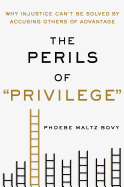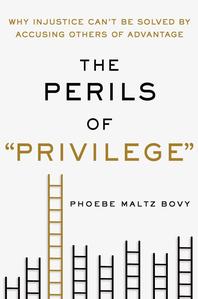
 Forward Sisterhood editor Phoebe Maltz Bovy delves into the virtue of a single word from the English language for her first book, The Perils of "Privilege." The cultural phenomenon concerning the idea of unearned advantages has taken on considerable power in business, political, educational and even social situations. Individuals are told to "check your privilege" at the slightest possible offense or are informed "your privilege is showing" (YPIS) when exhibiting any ignorance toward the plights of those in some way less fortunate than themselves. But Bovy argues that the function of privilege, originally intended to promote empathy and encourage change, has instead become a detriment to those ideals.
Forward Sisterhood editor Phoebe Maltz Bovy delves into the virtue of a single word from the English language for her first book, The Perils of "Privilege." The cultural phenomenon concerning the idea of unearned advantages has taken on considerable power in business, political, educational and even social situations. Individuals are told to "check your privilege" at the slightest possible offense or are informed "your privilege is showing" (YPIS) when exhibiting any ignorance toward the plights of those in some way less fortunate than themselves. But Bovy argues that the function of privilege, originally intended to promote empathy and encourage change, has instead become a detriment to those ideals.
By looking at the rise of the concept of privilege since the turn of the century--in areas like journalism, social media and casual conversation--Bovy identifies how privilege call-outs impede the conversations that should be taking place and supplant them with meaningless debate or navel-gazing: "Privilege once had that nuanced, reasoned use, but once checking started to enter into it--certainly once the 'your' got involved--the problems with it began."
Bovy uses a variety of examples to illustrate the failure of this approach to privilege to meet its intended goals, whether they be reminding individuals how their identity shapes their worldviews or attempting to effect change in systems inherently biased toward a specific group. Some applications of privilege are intended to sting, such as an insult pointing out one's unearned advantages. Or Bovy's term "sanctibullying--online pile-ons where the competition was over who could be the most sensitive." Either affront puts participants on the defensive, divides those communicating and turns the conversation away from the important issue.
But other examples can be well-meaning while producing the opposite of their intended outcome, like an elite college's elimination of test scores as an entrance requirement, replaced by projects, essays or portfolios. Many standardized tests contain biases, but the alternative options for admission allow those with more resources to acquire tutors or other forms of "help."
At times Bovy's abundance of examples can become mind numbing, but they offer significant food for thought in the smorgasbord of cultural sensitivity. And Bovy doesn't leave the reader with only objections to the use of privilege; she offers thoughts on what alternatives exist. She points out that this is more than just a change in terms. "If you're wondering what to hurl instead of a YPIS, my advice would be to simply refrain from hurling, period."
The Perils of "Privilege" is thoroughly researched and astute. The rich complexity of the subject matter makes for a slower read, demanding reflection and analysis for a complete and comprehensive understanding of Bovy's argument. But the result of such an investment can have profound outcomes. --Jen Forbus, freelancer
Shelf Talker: In an era when people are often called on to "check their privilege," Phoebe Maltz Bovy shows that the trend of encouraging hyperawareness is intensifying divisions.

